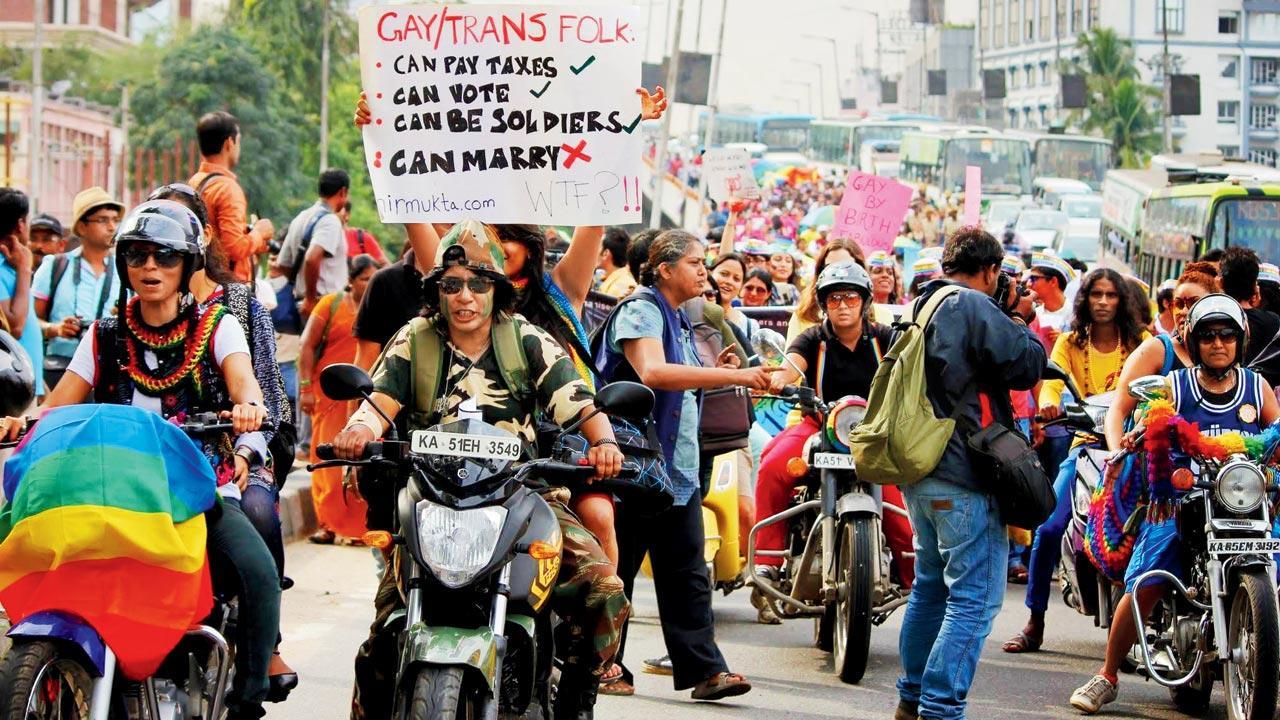While Facebook’s hate speech filters may have made it difficult to use the word, Indian women from the LGBTQAi+ community say they stand by the term unequivocally

The second edition of Dykes on Bikes in Bengaluru in 2011
In 2012, Dolly Koshy, a techie from Bengaluru, was one of the 15 women to rev up their engines and ride the streets during the Dykes on Bikes rally at the LGBT Pride Parade March. A notable symbol of queer pride, the original outfit was founded in 1976 at the San Francisco Pride Parade when a group of female motorcyclists gathered to ride side-by-side. Since the first protest, Dyke Marches have sprung up in cities around the world. “We weren’t an official chapter of the group, but we adopted it to show our solidarity. Those days, we would have meetings before the event, secure permissions and always be the ones leading the march,” says Koshy, who is proud and out, and continues to identify as dyke, although the outfit disbanded eight years ago.
But recent developments may make it problematic for those who want to publicly use the word, however well-intentioned. Recently, Facebook users in Plymouth who mentioned the Plymouth Hoe and Devil’s Dyke in Sussex were muted and blocked. The social media giant had to apologise after branding the Hoe and Dyke ‘hate speech’.
Dolly Koshi
The Merriam Webster dictionary states that the first known use of the word dyke was sometime in 1931. It also defines dyke as “lesbian, usually offensive.” “There are a lot of negative connotations associated with the word. Even lesbian women prefer to call themselves gay because it is a more acceptable, ‘happy’ word. Personally, I’m all for reclaiming terms that are used to put down the community,” says Koshy. Infused with elements of misogyny, dyke became a common slang for women loving women in the 1950s. The 1970s saw a whole new generation of lesbian feminists, who were unafraid to label themselves thus.
According to Shruti Chakravarty, a mental health practitioner and chief advisor at Mariwala Health Initiative in Mumbai, the historical assertion of dyke meant freedom in a male-dominated world. “There was a need to overthrow patriarchy and enable women to be free. Dykes essentially said, ‘we don’t need men’. It was an unpopular and threatening assertion to make and that essentially was the subversive potential of dyke.” Chakravarty identifies as butch lesbian cis, which means she identifies with the gender she was assigned at birth. “For me, butch is a masculine woman. I am not a man. My gender expression is masculine, which is what people find difficult to wrap their heads around because masculinity is equated with being a man. You can be a woman and be masculine.” There are odd instances in the community, when Chakravarty says she has faced situations where women have refused to go out with her because they think of her as a man.
Shruti Chakravarty
Sakshi Juneja, co-founder of Gaysi, says the term is used extensively even today, but mostly within the community. “It’s not really taken well when non-community persons mention dyke in place of lesbian or queer, depending on the label most comfortable to an individual.”
Another member from the community, who is based out of Bengaluru and did not wish to be identified for the story, says she gets why Facebook has chosen to ban the word. “In the West mostly, it’s still used as a slur. In the local community, we’d rather use queer because it is far more inclusive of multiple gender identities.”
Chakravarty says the typical assumption is that a dyke is a butch woman, but that may not necessarily be the case. “Dyke is used and owned by a lot of women, across gender identities, who may not consider themselves masculine. You can be femme and androgynous and still see yourself as dyke.”
Having said that, she believes that butch women give young people in the queer community the assurance that it’s possible to lead life as a masculine woman, “Because the only message a woman gets while growing up as as tom boy, is be more like a girl, dress more like a girl. In fact, my association with the word lesbian was fraught. It evoked shame and dislike. I’m very proud of it now but back then, I found it hard to use. Dyke somehow felt celebratory. For me, it means a woman who recognises who she is and is able to live by those values.”
1931
The year the term dyke was used for the first time, according to the Merriam Webster dictionary
 Subscribe today by clicking the link and stay updated with the latest news!" Click here!
Subscribe today by clicking the link and stay updated with the latest news!" Click here!









